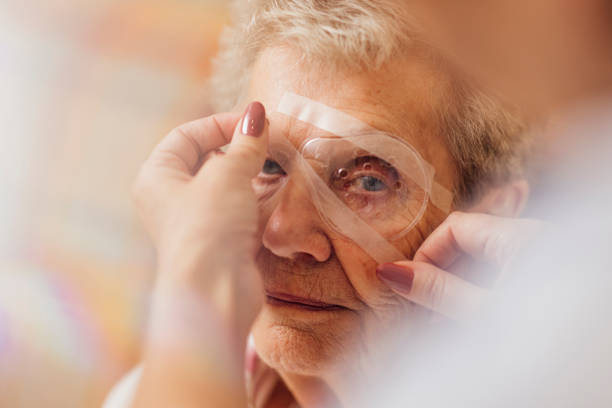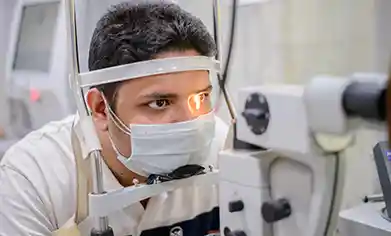Eye Care After Cataract Surgery: A Complete After-Care Guide by Renuka Doctors
Cataract surgery is a common and highly effective procedure that restores clear vision to millions of people worldwide. However, the journey to complete recovery doesn’t end in the operating room. In fact, the most critical phase begins after the surgery — during recovery. At Renuka Eye Institute, with branches in VIP Road Tegharia, Barasat, and Amtala, we understand how important it is for patients to take the right precautions after cataract surgery.
This blog serves as an informative after-care guide to help patients of all age groups protect their vision and heal properly after the procedure.
What to Expect After Cataract Surgery
- ● Mild discomfort or itching
- ● Sensitivity to light
- ● Watery eyes
- ● A feeling that something is in your eye
Why After-Care Matters
Cataract surgery involves removing the clouded natural lens and replacing it with an artificial intraocular lens (IOL). Proper post-operative care ensures:
- ● Faster healing
- ● Prevention of infection
- ● Stable visual results
- ● Long-term eye health
Essential Eye Care Tips After Cataract Surgery
1. Use Eye Drops as Prescribed
Your doctor will prescribe antibiotic and anti-inflammatory eye drops. These are crucial for:
- ● Preventing infection
- ● Reducing swelling
- ● Assisting the healing process
Use them exactly as instructed. Do not skip doses or stop early, even if your eye feels fine.
2. Avoid Touching or Rubbing the Eye
The urge to rub your eye can be strong, especially when it feels itchy or watery. But avoid touching or pressing on the operated eye at all costs, as it may cause:
- ● Infections
- ● Displacement of the lens
- ● Increased pressure
Wear a protective eye shield while sleeping for at least a week to avoid accidental rubbing.
3. Wear Sunglasses Outdoors
Your eyes will be extra sensitive to sunlight after surgery. Whenever you go outside, especially in areas like Tegharia, Barasat, or Amtala where dust and sunlight are common, wear UV-protected sunglasses to protect your healing eyes.
4. Prevent Water From Entering the Eye
Keep water away from your eyes for at least 7 to 10 days. Avoid:
- ● Washing your face directly
- ● Swimming
- ● Taking head showers
Instead, use a damp cloth to gently clean around the eyes. Water can carry bacteria that might cause infections.
5. Avoid Strenuous Activities
Refrain from the following for the first 2 to 3 weeks:
- ● Heavy lifting
- ● Intense exercise
- ● Bending your head below your waist
These activities can increase pressure in your eyes and slow down healing.
6. Don’t Drive Immediately
Your vision may be unstable for a few days post-surgery. Avoid driving until your doctor clears you — typically after the first follow-up when your vision is tested.
7. Maintain Cleanliness
Your surroundings and hands must be clean when applying eye drops or adjusting your eye shield. Use sterilized gauze or tissues and wash your hands before touching anything near your eyes.
8. Attend Follow-Up Visits
Follow-up visits are vital for monitoring healing and adjusting medications. At Renuka Eye Institute, we schedule timely follow-ups at our VIP Road Tegharia, Barasat, or Amtala branches to ensure your recovery stays on track.
Diet Tips for Faster Recovery
Eat More Of:
- ● Green leafy vegetables (Vitamin A & C)
- ● Citrus fruits like oranges and lemons
- ● Nuts and seeds (Vitamin E and Omega-3)
- ● Fish (if non-vegetarian) for natural anti-inflammatory properties
- ● Plenty of water to stay hydrated
Avoid:
- ● Excessive oily, fried, or spicy food
- ● Alcohol and tobacco
- ● Processed or junk food
What to Avoid After Cataract Surgery
- ❌ Makeup Around the Eyes
- ❌ Dusty or Polluted Environments
- ❌ Using Old or Dirty Towels
- ❌ Exposure to Smoke or Chemical Fumes
Warning Signs You Shouldn’t Ignore
- ● Sharp or increasing pain
- ● Vision that worsens suddenly
- ● Intense redness
- ● Discharge or swelling
- ● Flashes of light or floaters
How Long Does It Take to Recover Fully?
Most patients can resume normal activities within a week, but full recovery takes about 4 to 6 weeks. Vision stabilizes during this period, and your eyes adjust completely to the new lens.
Benefits of Choosing Renuka Eye Institute for Cataract After-Care
- ● Highly experienced cataract surgeons
- ● Personalized after-care instructions
- ● Modern facilities and diagnostic tools
- ● Easy access through three locations – VIP Road Tegharia, Barasat, and Amtala
- ● Patient-centric support for all age groups, from young adults to senior citizens
Expert Advice for Specific Age Groups
For Seniors (60+):
- ● Get assistance while moving around to avoid falls
- ● Avoid bending or physical strain completely
- ● Monitor blood sugar or blood pressure if diabetic or hypertensive
For Working Adults:
- ● Reduce screen time for at least the first week
- ● Take breaks if returning to work early
- ● Don’t skip follow-up appointments due to work
For Teenagers or Younger Patients:
- ● Follow activity restrictions strictly
- ● Avoid rubbing eyes while sleeping
- ● Inform teachers or guardians about recent surgery
Final Thoughts
Eye care after cataract surgery is essential for achieving clear, long-lasting vision. By following the proper after-care steps, you minimize risks and ensure faster healing.
Whether you're in Tegharia, Barasat, or Amtala, you have expert care available nearby at Renuka Eye Institute. Our team is always ready to guide you through your recovery journey with compassion, expertise, and personalized attention.
Visit Renuka Eye Institute
● VIP Road Tegharia | Barasat | Amtala – Kolkata
● Call us at +91 70440 19151
● Visit: https://renukaeyeinstitute.org/
● Timings: [Insert Clinic Hours]
Renuka Eye Institute — Your Vision, Our Commitment.









